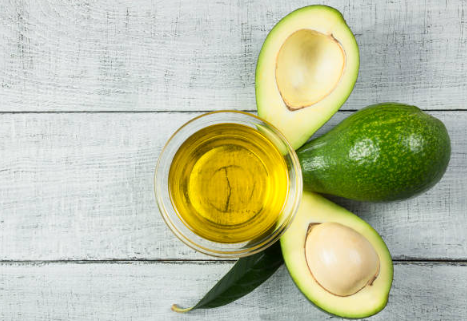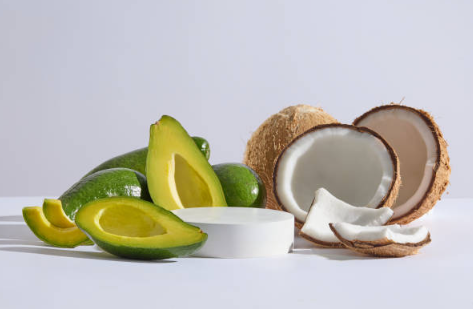Avocado oil is often ranked among the healthiest cooking oils. While it’s become increasingly popular and more accessible on grocery store shelves, making smart choices about which type to buy—and how to use it—still matters. So what are the benefits of avocado oil, and how does it compare to other oils? Here’s everything you need to know.
🥑 The Top Benefits of Avocado Oil
Avocado oil is more nutritious than many other cooking oils, especially seed-based varieties. Here are its top science-supported advantages:
1. It Has a High Smoke Point
A cooking oil’s smoke point is the temperature at which it starts to burn and smoke. When this happens, the oil breaks down, releasing inflammatory free radicals and trace amounts of the potentially harmful compound acrolein—which has been linked to heart disease and Alzheimer’s.
Avocado oil has a significantly higher smoke point than most other oils:
-
Unrefined avocado oil: ~480°F (249°C)
-
Refined avocado oil: ~520°F (271°C)
By comparison:
-
Extra virgin olive oil: ~350°F
-
Vegetable oil: ~400°F
This makes avocado oil ideal for high-heat cooking methods like sautéing and roasting.

2. It May Support Gut Health
Emerging research suggests that avocado itself can positively influence the gut microbiome—and avocado oil may offer similar benefits.
In a 12-week study of 163 participants who ate up to 175g of avocado per day, researchers found improved gut bacteria diversity and lower bile acid concentrations, indicating better digestive movement.
3. It’s Good for Your Heart
Avocado oil is rich in oleic acid, a heart-healthy monounsaturated omega-9 fat. Studies show that monounsaturated fats can help lower LDL (“bad”) cholesterol, while improving the total-to-HDL (“good”) cholesterol ratio, both of which reduce heart disease risk.
Avocado oil also contains linoleic acid, which has been linked to a lower risk of cardiovascular disease.
4. It May Help Lower Cholesterol
Because avocado oil is high in monounsaturated fats, it can help reduce cholesterol when used in place of saturated fats.
In a small crossover study published in the Journal of Functional Foods, participants consumed meals with 25g of butter or 25g of avocado oil. Bloodwork showed that those who ate avocado oil had lower levels of triglycerides, LDL cholesterol, and blood glucose after eating.
5. It Supports Healthy Vision
Avocado oil is rich in lutein, a powerful antioxidant that’s essential for eye health but can’t be made by the body.
Lutein intake is linked to a reduced risk of cataracts and age-related macular degeneration (AMD). It also helps protect the eyes by filtering blue light and neutralizing harmful free radicals—basically acting like a built-in pair of sunglasses.
6. It Nourishes Skin and Hair
The fatty acids and vitamins A and E in avocado oil help promote skin elasticity and hair strength.
Topical uses of avocado oil include:
-
Moisturizing creams and serums
-
Scalp treatments and hair masks
It contains carotenoids, which support DNA repair, and vitamin E, which plays a vital role in sebum production, helping maintain smooth, hydrated skin.
7. It’s Incredibly Versatile in Cooking
Avocado oil works well across a variety of recipes:
-
Use it as a base for salad dressings
-
Drizzle over vegetables before roasting
-
Substitute for butter in baked goods
-
Brush over fish before baking
-
Add to pan-seared dishes or stir-fries
Its neutral flavor makes it especially flexible in both savory and sweet recipes.

🥄 Avocado Oil vs. Other Oils
🥥 Avocado Oil vs. Coconut Oil
-
Smoke point: Avocado oil (480–520°F) is higher than coconut oil (350–450°F)
-
Fat profile: Avocado oil is rich in unsaturated fats
Coconut oil is high in saturated fat and solid at room temperature, making it harder to work with for some recipes.
🌿 Avocado Oil vs. Olive Oil
While olive oil has been more extensively studied, both offer heart-healthy fats and antioxidants. Avocado oil has a higher smoke point, making it better for high-heat cooking. Both are excellent staples for a balanced diet.
🔧 How to Use Avocado Oil Daily
Here are a few easy ways to incorporate it:
-
As a salad dressing base
-
Drizzled over roasted vegetables
-
In place of butter in baking
-
Brushed on seafood or grilled meats
-
As a scalp or skin treatment
🧊 How to Store Avocado Oil
To preserve its nutrients, store avocado oil:
-
In a cool, dark place like a pantry or cabinet
-
Away from light and heat
-
Once opened, it’s best used within 8 months
-
Refrigeration may extend shelf life
⚠️ Potential Downsides
-
High in fat: Though it’s healthy fat, avocado oil still contains 13% fat by weight
-
High in calories: One teaspoon = over 100 calories
-
Be mindful if you’re trying to lose weight
-
Remember: Most of your healthy fats shouldn’t come from oil alone. Whole foods like avocados, nuts, and seeds also offer fiber, vitamins, and satiety—not just fat.